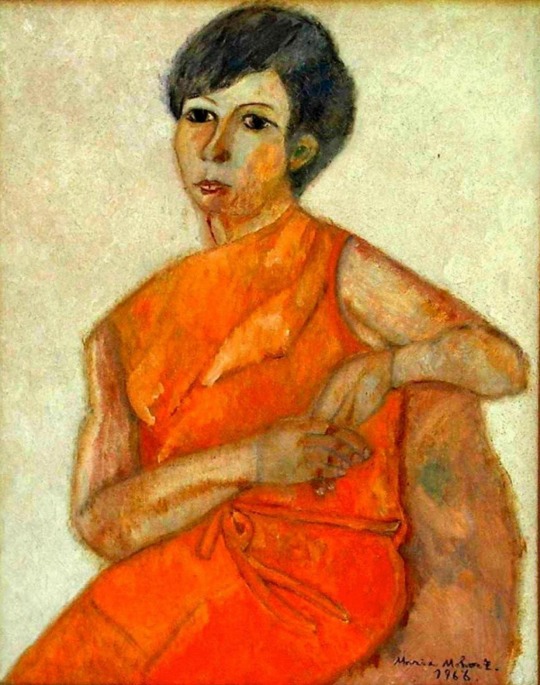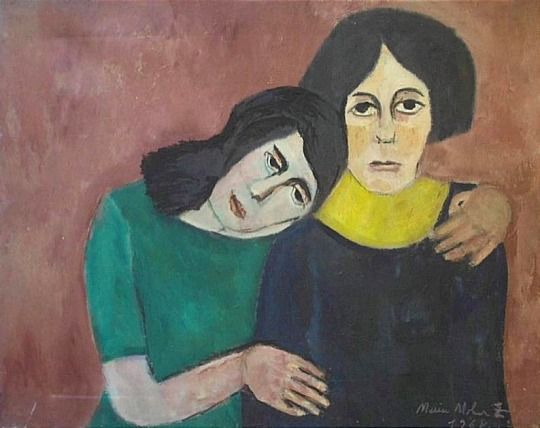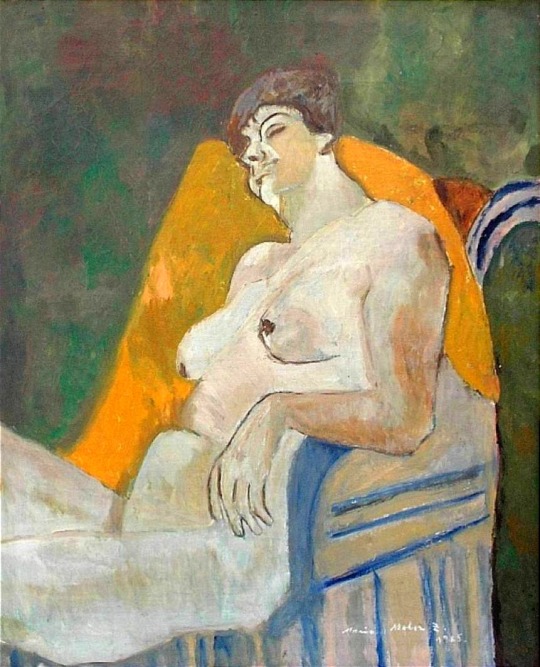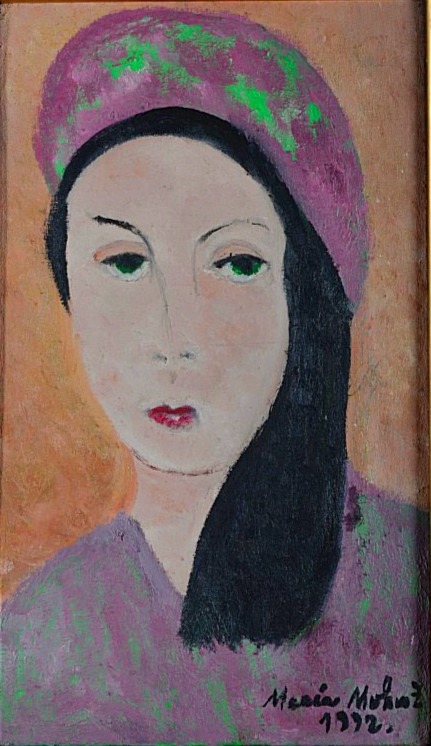Text
María Mohor Zummers (1920-2002) pintora y escultora chilena. Nacida en la ciudad de Concepción. De ascendencia árabe palestina.


Con estudios superiores en arte, en 1963 obtiene el título de Licenciada en Humanidades e ingresa a la Escuela de Bellas Artes de la Universidad de Chile. Su presencia en la historia de las artes visuales chilenas es parcialmente desconocida.


Vivió junto a sus hermanas y hermanos en la ciudad de Santiago, donde además produjo la mayoría de sus obras. A lo largo de su vida expuso en destacadas galerías de Chile y en el extranjero, obteniendo por ello importantes premios y distinciones como el premio Pablo Neruda del Museo de Arte Contemporáneo de Santiago en el año 1968.


Cuesta asociarla con algún movimiento y encontrarle compañeros de senda o discípulos. Posterior a su muerte, deja un gran patrimonio cultural en su colección compuesta por más de 300 obras, entre pinturas, grabados, esculturas y mosaicos, la cual es custodiada y preservada por la Fundación María Mohor Zummers.

17 notes
·
View notes
Text
youtube
Watch How They Smile (1962) - Violeta Parra
Not my translation
1 note
·
View note
Video
youtube
Wind from the people
They want to stain my land again with worker’s blood. The ones that talk about liberty have dark hands.
The ones that want to separate the mother from her children want to rebuild the cross that will drag Christ.
They want to hide the infamy that they have bequeathed for centuries, but the color of a murderer they will not erase from their faces.
It’s already been thousands and thousands that have given away their blood and have in generous floods multiplied the bread.
Now I want to live alongside my son and my brother the spring that everyone of us is building day by day.
The threat does not scare me, patrons of misery. The star of hope will continue being ours.
Wind of the people call me Wind of the people carry me They spread my heart and winnow my throat.
So will the poet sing while my soul sounds by the paths of the people for now and forever.
11 notes
·
View notes
Video
youtube
The Right to live in Peace (1971)
In the light of recent events, this song being used often in protests in Chile right now, I thought I could share a translation to this song.
The right to live, poet Hồ Chí Minh, that strikes all of humanity from Vietnam no cannon will erase the furrow of your ricefield The right to live in peace
IndoChina is the place beyond the wide sea where they destroy the flower with genocide and napalm The moon is an explosion that melts all clamor The right to live in peace
And I with our song out of fire of pure love It’s a dove’s dovecote, an olive of an olive grove It’s the universal song, a chain that will bring triumph The right to live in peace is the universal song, a chain that will bring triumph The right to live in peace
2 notes
·
View notes
Video
youtube
Latin America is a town south of the U.S. (1984)
For tourists, curious people, it’s an exotic place to visit It’s a cheap place, but inadequate to inhabit Latin America offers you: The river carnival and the Aztec ruins Dirty people wandering in the streets, willing to sell themselves for some US dollars
Nobody on the rest of the planet takes this immense town full of sadness seriously They smile when they see that it has twenty-something little flags Each one prouder than the other of its sovereignty What nonsense! To divide is to weaken
The powers are the protectors that try out their weapons in our guerrillas Whether they are red or striped, at the time of the end there is no difference They invite our leaders to sell their soul to the green devil They invent nice acronyms to make them feel a little more important
And the innocent people of Latin America will cry if Ronald Reagan or the Queen dies And they follow each and every event of Carolina’s (princess of Hannover) life as if those people suffered from their underdevelopment We are in a pit! it seems that it’s true: Latin America is a town south of the U.S. (x4)
So they feel as if they were along family, we copy their neighborhoods and their lifestyle We try to talk in the jet-set language so that they don’t think we’re uncivilized When we visit their cities they register us and treat us like criminals Russians, English, Gringos, French They laugh at our fictional directors
We are such a charming little town that everyone help us if it’s for starting a war But that same amount of gold could be given to find the final solution to hunger Latin American is big It must learn to decide Latin America is a town south of the U.S. (x11)
Los prisioneros were a band active during the dictatorship in Chile with great socio-political impact. Many of their songs were used in protests against the regime, which caused their music to be banned between 1985 and 1990. In 1987, they supported the “No”-campaign by recording an album. This campaign, a project of various artists, would later “succesfully” end the dictatorship through voting.
They were pioneers in the Latino Rock genre, after Violeta Parra and Victor Jara, they began a new Era of chilean music. (x)
0 notes
Video
youtube
Manifest (1973)
I don’t sing just to sing nor because I have a good voice. I sing because the guitar has sense and reason, It has a heart of earth and wings of a dove, it’s like holy water it crosses glories and sorrows. Here my singing has found its place as Violeta (Parra) would’ve said: a working guitar with the smell of spring.
This is not a guitar of the rich not anything of the sort. My singing is from the scaffolding to reach the stars. Singing has a reason, when it throbs in the veins, of the one who will die singing the true truths, not fleeting flattery nor the foreign fame but the song of a lark to the bottom of the earth.
There where everything arrives and where everything starts singing that has been brave will always be “Canción nueva”.
“Manifiesto” is an unfinished song of the album Victor Jara was working on shortly before his assassination. He was killed among many others on the very same day of the US backed Coup d’État on Salvador Allende in Chile.
“Canción nueva” is a style started by Violeta Parra, which built a foundation for many south american artists.
1 note
·
View note
Video
youtube
Why do the rich (1986)
They go to their schools to play With the priests with the nuns Of the charity
With their bodies full of food They grow like Europeans Blond and robust
They keep us out of university They fill their notebooks with unparalleled grades Their heads know everything there is to answer
Having numbered schools They teach us humility and resignation They explain to us that it is over Can’t try to even think about becoming a professional
Your education is crap I, with those grades, would not even try Dedicate yourself to being a thief, lazy or a slave
And never try to understand: Why, why do the rich Why, why do the rich have the right to have such a good time have the right to have a good time Why, why do the rich Why, why do the rich have the right to have such a good time If they are just as stupid as the poor
There they go crossing their city Partying in their cars or in their dad's Enjoying their youth, with the right of the heir from the owners of South America
Sometimes some feel like bringing equality they form entities, they play-fight with outcasts or inmates and intellectuals Yet everything is still the same, still the same
Why, why do the rich Why, why do the rich have the right to have such a good time have the right to have such a good time Why, why do the rich Why, why do the rich have the right to have such a good time If they are so stupid If they are so stupid If they are so stupid
And those above continue as they were And those below continue as they were And nobody wants to see an end If those below believe What they say above Who will I trust? Maybe in the end I won’t care.
Tell me why So many Mercedes, so much food... So many words, so many lies...
Those that can afford it in Chile, go to private schools. The rest of the schools are numbered, and provide a precarious environment for the rest of the people to learn in.
2 notes
·
View notes
Video
youtube
“This song is called “I remember you, Amanda”. And this song, it talks about the love of two workers. Two workers of the now, of those, that you yourself see in the streets and sometimes do not realize, what exists within the soul of two workers of any factory, in any city, in any place, of our continent. I remember you, Amanda.” – Victor Jara
I remember you Amanda (1969)
I remember you Amanda The wet street Running to the factory where Manuel worked The smile wide, rain in your hair, It didn’t matter, you were going to meet him with him, with him, with him, with him, with him Five minutes, life is eternal in five minutes The siren sounds, back to work, And with your walking you illuminate everything The five minutes, they make you bloom I remember you Amanda The wet street Running to the factory where Manuel worked The smile wide, rain in your hair It didn’t matter, you were going to meet him With him, with him, with him, with him, with him That departed to the mountains That never hurt no one That departed to the mountains And in five minutes, he was in pieces The siren sounds, back to work Many did not return Neither did Manuel I remember you Amanda The wet street Running to the factory where Manuel worked
Víctor Jara was a chilean teacher, theater director, poet, singer-songwriter and political activist. The focus on his songs was often the working class, poverty, human rights and love. After being gruesomely murdered, having been the first wave of resistance against the US-backed dictatorship of Augusto Pinochet, he became the voice of the opressed.
1 note
·
View note
Video
youtube
Run Run headed North (1966)
On a car made of oblivion, before dawn broke, on a transit station, resolved to keep rolling. Run Run headed north, I don’t know when he’ll come back. He’ll come back for the birthday of our loneliness. Three days after, a letter with coral handwriting, tells me that his trip keeps getting longer and longer. He left from Antofagasta without leaving a trace and tells of an adventure that I will now spell out. Woe, woe, woe is me. In the middle of a multitude that he had to face, during a layover due to the last hurricane, at a devastated port near Vallenar, with a cross upon his shoulder, Run Run had to cross.
Run Run continued his journey and reached Tamarugal. Sitting on a rock his thoughts started wandering about this and about that, about never, about “and also…” about life being a lie and death being for real. Woe, woe, woe is me. Thing is, that on a saddlebag he started rummaging around. He got out paper and ink, perhaps, a memory as well. Without sorrow or joy, without glory or mercy, without rage or bitterness, without crudeness or freedom.
Empty like a hole of the earthly world, Run Run sent his letter just for the sake of sending it. Run Run headed North while I stayed in the South, and in-between there is an abyss with no music or light. Woe, woe, woe is me.
The calendar wore out the train’s wheels the numbers of the year the track’s edge. More spins of the iron wheels, more clouds in the month, the tracks are longer, the aftermath more bitter.
Run Run headed North, what can we do about it. Such is life, then, thorns of Israel, crucified love, the crown of contempt, the nails of martyrdom, the vinegar and the bile. Woe, woe, woe is me.
A song by Violeta Parra, about her runaway love.
“ The stadium had to be emptied because of the approaching World Cup qualifying match in which Chile would play the Soviet Union. We were told that we’d all be transferred to northern Chile, to the desert. […] Walking along the running track, our heads bowed and trying to catch the breath needed for that moment, we suddenly heard a murmur greeting and singing to us “Run Run, se fue pa’l norte, no sé cuándo vendrá….” (Run Run went up North, I don’t know when he’ll come…). The whispering voices came from the sector where the female comrades were held. Our skin tingled and tears welled up in more than one of us. We turned to greet them and raising our arms in greeting, we sent them a comradely kiss. “ - a testimony of a prisoner held in the make-do concentration camp in Chile November 1973. (source: Cantos Cautivos)
0 notes
Video
youtube
The exiled of the South (1971)
One eye I left in Los Lagos out of casual carelessness The other stayed in Parral in a drinking inn I remember that a lot of depredation my soul saw as a child Miseries and treachery entangle my thoughts Amongst the waters and the wind I lose myself in the distance My right arm in Buín remained, dear listeners The other in San Vicente remained, I do not know with what purpose My chest in Curacautín I see it in a little garden My hands in Maitencillo greet in Pelequén My skirt in Pirilauquén catches some minnows In San Rosendo my foot was enmeshed crossing a corner The other in the Quiriquina is sinking into the sea My discontented heart beat with grief in Temuco And it has cried in Calbuco cold by a frost I go and straighten my march to the slope in Chacabuco My nerves left in Graneros, my blood in San Sebastián And in the city of Chillán my calm decreased down to zero My kidney in Cabrero is in the way of a path And in a street of Itata my instrument was broken I foist myself to Nacimiento a silver morning
Disembarking in Riñihue Violeta Parra was seen Without strings on her guitar, without leaves on the Colihue A band of yellow finches came to give her a concert Disembarking in Riñihue Violeta Parra was seen Disembarking in Riñihue Violeta Parra was seen
Violeta Parra was a chilean composer, songwriter, folklorist, and ethnomusicologist. She collected and recorded authentic Chilean folk music from all over the country, as it was taught from one person to the other and never written down, it would’ve been lost otherwise.
The poem featured in this song was written by her, describing her journey. Inti-Illimani used it as lyrics, and added the last verse as an homage to her legacy. (x) (x)
#chile#violeta parra#cancion nueva#inti illimani#inti-illimani#70s#sudamerica#south america#musica sudamericana
4 notes
·
View notes